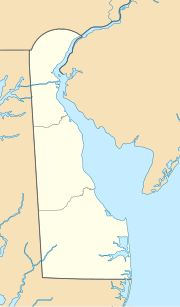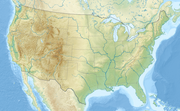Bearhole Ditch is a 4.57 mi (7.35 km) long 2nd order tributary to Dirickson Creek, in Sussex County, Delaware.
| Bearhole Ditch Tributary to Dirickson Creek | |
|---|---|
| Location | |
| Country | United States |
| State | Delaware |
| County | Sussex |
| Physical characteristics | |
| Source | Vines Creek divide |
| • location | about 1 mile north of Selbyville, Delaware |
| • coordinates | 38°29′19″N 075°13′07″W / 38.48861°N 75.21861°W[1] |
| • elevation | 40 ft (12 m)[2] |
| Mouth | Dirickson Creek |
• location | about 0.1 miles north of Johnson, Delaware |
• coordinates | 38°28′50″N 075°08′11″W / 38.48056°N 75.13639°W[1] |
• elevation | 0 ft (0 m)[2] |
| Length | 4.57 mi (7.35 km)[3] |
| Basin size | 7.78 square miles (20.2 km2)[4] |
| Discharge | |
| • average | 9.11 cu ft/s (0.258 m3/s) at mouth with Dirickson Creek[4] |
| Basin features | |
| Progression | generally east |
| River system | Little Assawoman Bay |
| Tributaries | |
| • left | unnamed tributaries |
| • right | unnamed tributaries |
| Bridges | DE 17 Gum Road Hudson Road Deer Run Road Bearhole Road Johnson Road DE 20 |
Variant names
editAccording to the Geographic Names Information System, it has also been known historically as:[1]
- Bear Hole Ditch
- Dirickson Creek
Course
editBearhole Ditch rises on the Vines Creek divide about 1 mile north of Selbyville in Sussex County, Delaware. Bearhole Ditch then flows generally east to meet Dirickson Creek about 0.1 miles north of Johnson, Delaware.[2]
Watershed
editBearhole Ditch drains 7.78 square miles (20.2 km2) of area, receives about 44.8 in/year of precipitation, has a topographic wetness index of 723.32 and is about 3.5% forested.[4]
See also
editReferences
edit- ^ a b c "GNIS Detail - Bearhole Ditch". geonames.usgs.gov. US Geological Survey. Retrieved 25 February 2020.
- ^ a b c "Batson Branch Topo Map, Sussex County DE (Selbyville Area)". TopoZone. Locality, LLC. Retrieved 24 February 2020.
- ^ "ArcGIS Web Application". epa.maps.arcgis.com. US EPA. Retrieved 24 February 2020.
- ^ a b c "Bearhole Ditch Watershed Report". Waters Geoviewer. US EPA. Retrieved 25 February 2020.

